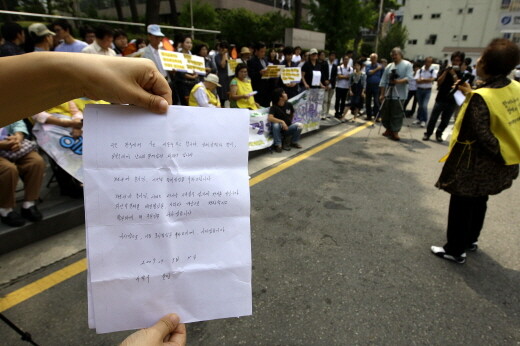hankyoreh
Links to other country sites 다른 나라 사이트 링크
[Analysis] S. Korea looks to new Japan prime minister’s effect on Korea-Japan relations

“The joy of changing history is joined by heavy responsibility.”
This remark comes from Japan’s Prime Minister Hatoyama Yukio, who took office Wednesday. His new Democratic Party of Japan administration, which undid the Liberal Democratic Party’s 54-year grip on power, has been internally advocating debureaucratization and livelihood politics, and externally declaring a line of egalitarianism in diplomacy with the U.S. and an emphasis on East Asia.
Will Hatoyama’s inauguration mark the beginning of a new age in South Korea-Japan relations? Next year is the 100th anniversary of Korea’s forced annexation into the Japanese Empire. Some figures within Japanese and Korean intellectual society are noting the possibility that next year will provide the opportunity for a “Hatoyama statement” that moves beyond the limits of the 1995 statement made by Social Democratic Party Prime Minister Murayama Tomiichi. In that statement, Murayama acknowledged and apologized for the Japanese Empire’s war of aggression and colonial rule. The statement was subsequently solidified into the official position of the Japanese government, but it did not hold the Japanese Emperor responsible for the war, and it remained vague on the responsibility of the Japanese leadership during the war and the invalidation of the 1910 Japan-Korea Annexation Treaty.
In an interview Wednesday with the Hankyoreh, University of Tokyo Professor Emeritus Wada Haruki called the 100th anniversary “an opportunity from the heavens for forming a new relationship between Japan and South Korea.” Wada also said that Murayama’s statement “possesses various limitations, so from the outset, they need to present a bold statement that incorporates Korean calls about the invalidity of the 1910 Japan-Korea Annexation Treaty.” He also called for solidarity among Korean and Japanese intellectuals to urge Hatoyama to issue his own statement.
University of Tokyo Professor Kimiya Tadashi said, “In 2010, relations between the two countries will inevitably be tense because of the 100th anniversary issue.” In that sense, Kimiya predicted a chance the Democratic Party of Japan will create the opportunity for something like a “Hatoyama statement.”
The new Prime Minister raised expectations on Sept. 4 when he said that his administration “might be capable of looking directly at the past” during South Korean Ambassador to Japan Kwon Chul-hyun’s visit. Since 1998, Hatoyama has played a leading role in presenting legislation to address Japan’s past deeds, including a bill to revolve the issue of women coerced into sexual slavery during wartime. Terashima Jitsuro, the president of Japan’s Tama University and the man referred to as the “real brains” behind the formulation of Hatoyma’s foreign policy line, touted Japan’s recent “joining Asia” diplomacy and said, “Now is the chance to launch joint projects between South Korea, China and Japan.”
Observers within South Korea are also noting the possibility that the new Hatoyama administration will bring about real improvements in the two countries’ relations. However, some are also commenting that it is unwise to build up expectations, given factors that include public opinion within Japan. “I think that relations between the two countries will improve from where they are currently as a result of the Democratic administration taking office,” said Kwon Hyuk-tae, professor of SungKongHoe University. “But the two countries need to tackle problems head on in a fundamental way rather than putting them off or glossing them over,” Kwon added.
Some observers are also suggesting that President Lee Myung-bak needs to take a more strategic approach with Japan to boldly address its past deeds, rather than focusing on issues such as securing a visit from the Japanese Emperor to South Korea as was mentioned on Tuesday. Others are noting the need for serious efforts by the South Korean government and civil society to raise the issue. Experts are predicting that the House of Councilors elections slated for next July in Japan will be an important hurdle to clear before the Democrats’ policy regarding the Korean Peninsula takes shape.
Please direct questions or comments to [englishhani@hani.co.kr]
Editorial・opinion
![[Editorial] Perilous stakes of Trump’s rhetoric around US troop pullout from Korea [Editorial] Perilous stakes of Trump’s rhetoric around US troop pullout from Korea](https://flexible.img.hani.co.kr/flexible/normal/500/300/imgdb/original/2024/0509/221715238827911.jpg) [Editorial] Perilous stakes of Trump’s rhetoric around US troop pullout from Korea
[Editorial] Perilous stakes of Trump’s rhetoric around US troop pullout from Korea![[Guest essay] Preventing Korean Peninsula from becoming front line of new cold war [Guest essay] Preventing Korean Peninsula from becoming front line of new cold war](https://flexible.img.hani.co.kr/flexible/normal/500/300/imgdb/original/2024/0507/7217150679227807.jpg) [Guest essay] Preventing Korean Peninsula from becoming front line of new cold war
[Guest essay] Preventing Korean Peninsula from becoming front line of new cold war- [Column] The state is back — but is it in business?
- [Column] Life on our Trisolaris
- [Editorial] Penalties for airing allegations against Korea’s first lady endanger free press
- [Editorial] Yoon must halt procurement of SM-3 interceptor missiles
- [Guest essay] Maybe Korea’s rapid population decline is an opportunity, not a crisis
- [Column] Can Yoon steer diplomacy with Russia, China back on track?
- [Column] Season 2 of special prosecutor probe may be coming to Korea soon
- [Column] Park Geun-hye déjà vu in Yoon Suk-yeol
Most viewed articles
- 1‘Free Palestine!’: Anti-war protest wave comes to Korean campuses
- 2[Editorial] Perilous stakes of Trump’s rhetoric around US troop pullout from Korea
- 3Korean president’s jailed mother-in-law approved for parole
- 4Nuclear South Korea? The hidden implication of hints at US troop withdrawal
- 5In Yoon’s Korea, a government ‘of, by and for prosecutors,’ says civic group
- 6[Photo] ‘End the genocide in Gaza’: Students in Korea join global anti-war protest wave
- 7Behind-the-times gender change regulations leave trans Koreans in the lurch
- 8Korea likely to shave off 1 trillion won from Indonesia’s KF-21 contribution price tag
- 9With Naver’s inside director at Line gone, buyout negotiations appear to be well underway
- 1060% of young Koreans see no need to have kids after marriage